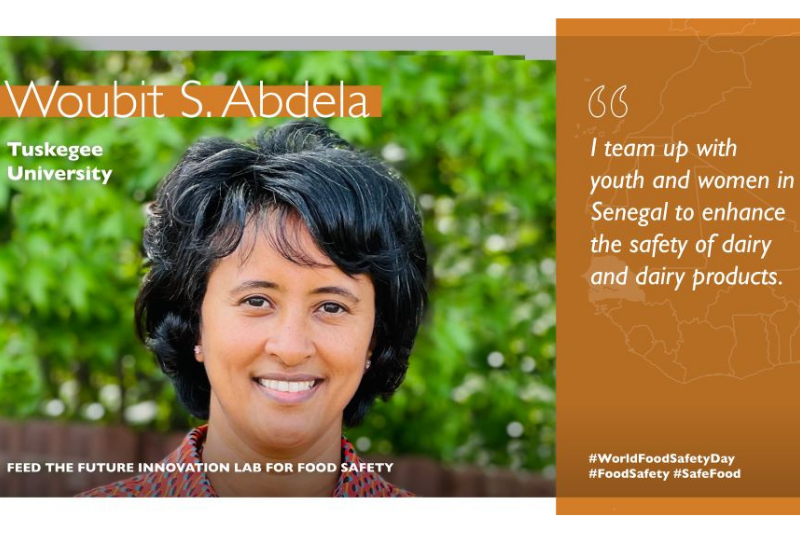
We believe investing in data-driven, locally sustainable food safety practices and policies will break cycles of disease and malnutrition. On World Food Safety Day, we highlighted Food Safety Innovation Lab colleagues working for safe and healthy diets around the world.
Targeted interventions can safeguard poultry produced on small farms from contact with foodborne pathogens. Barbara is working with women and youth farmers in Kenya to develop a risk-based roadmap to strengthen #FoodSafety. #WorldFoodSafetyDayhttps://t.co/C4cZyMbS4F pic.twitter.com/IDZIWEwMB5
— Feed the Future Food Safety Innovation Lab (@FoodSafetyIL) June 7, 2021
Contamination of fresh vegetables with foodborne pathogens undermines their nutritional potential. Chanthol works with a team targeting food safety gaps in the production, distribution, & sale of vegetables in Cambodia. #WorldFoodSafetyDayhttps://t.co/RXn223gwCU pic.twitter.com/GK1WFbLqaF
— Feed the Future Food Safety Innovation Lab (@FoodSafetyIL) June 7, 2021
Women are key players in dairy production and sales in Senegal. Marème is working to ensure their contributions, expertise, and needs are reflected in the sector’s food safety practices. #WorldFoodSafetyDayhttps://t.co/4uwuD2YtJv pic.twitter.com/8JNCWtd6QR
— Feed the Future Food Safety Innovation Lab (@FoodSafetyIL) June 7, 2021
Is COVID-19 transmitted by food? No, but outbreaks among food workers can disrupt supply chains and threaten food security. Jaya works with other international experts to provide answers and options for the food industry. #WorldFoodSafetyDay https://t.co/Q6zJK4N0fh pic.twitter.com/4OUxfnDJlg
— Feed the Future Food Safety Innovation Lab (@FoodSafetyIL) June 7, 2021
In the Bangladeshi diet, fish and chicken are vital, affordable sources of protein. Pratheesh and his colleagues are identifying when and where food safety interventions can reduce exposure to foodborne pathogens. #WorldFoodSafetyDayhttps://t.co/ETCUTIbpNK pic.twitter.com/8sbznYkqWl
— Feed the Future Food Safety Innovation Lab (@FoodSafetyIL) June 7, 2021
Dairy production is taking off in Senegal, and Woubit is working with a team of colleagues in the U.S. and #Senegal to build food safety capacity across the dairy value chain, from small farms to finished products. #WorldFoodSafetyDayhttps://t.co/4uwuD2YtJv pic.twitter.com/ykpTKXk08P
— Feed the Future Food Safety Innovation Lab (@FoodSafetyIL) June 7, 2021
To help the food industry in Africa and Asia manage the risks associated with COVID-19, George and other experts create customized materials, answer FAQs, and hold virtual office hours. #WorldFoodSafetyDayhttps://t.co/t7kpMUgPJB pic.twitter.com/o9R2XAyL8d
— Feed the Future Food Safety Innovation Lab (@FoodSafetyIL) June 7, 2021
Vegetables are key to reducing malnutrition, but if eaten raw they can carry a risk of foodborne pathogens. Navin works with colleagues in the U.S. and Cambodia to ensure nutritious, fresh vegetables are safe foods. #WorldFoodSafetyDayhttps://t.co/RXn223gwCU pic.twitter.com/xF1jMa7TBC
— Feed the Future Food Safety Innovation Lab (@FoodSafetyIL) June 7, 2021
Small-scale poultry production offers nourishment & economic opportunity. Robert works with colleagues @OSUFoodScience on strategies to reduce the risk of foodborne illness to poultry farmers & consumers in Kenya. #WorldFoodSafetyDay https://t.co/C4cZyMbS4F pic.twitter.com/2wkFq2k3kG
— Feed the Future Food Safety Innovation Lab (@FoodSafetyIL) June 7, 2021
The pandemic has disrupted global food systems and increased food insecurity. Beth works with the international task force on our COVID-19 response project to protect the food system and reduce risks to its workers. #WorldFoodSafetyDayhttps://t.co/fUYlEPSScX pic.twitter.com/8XqO6mpU1R
— Feed the Future Food Safety Innovation Lab (@FoodSafetyIL) June 7, 2021


